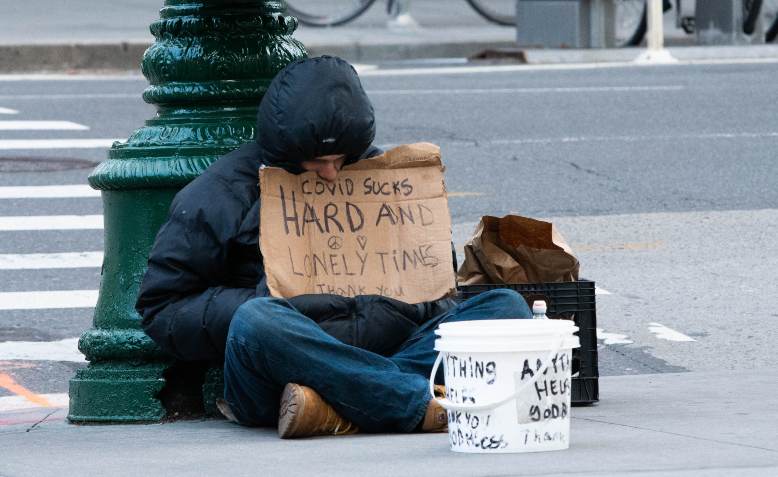 Homeless man in New York under lockdown. Photo: Anthony Quintano / Wikimedia Commons / CC BY 2.0, license linked at bottom of article
Homeless man in New York under lockdown. Photo: Anthony Quintano / Wikimedia Commons / CC BY 2.0, license linked at bottom of article
The government is refusing to house homeless people at risk from Covid and subzero temperatures, writes Norbert Lawrie
Hundreds of deaths were prevented in the first wave of the pandemic when emergency accommodation was provided to anyone rough sleeping. However, since then, thousands of people have become street homeless.
Now with the new Sars-CoV-2 variant, there is a substantially higher infection rate and so is the risk to life of people sleeping rough on our streets.
During the first lockdown the ‘Everybody In’ policy saw approximately 29,000 people helped into accommodation, with thousands initially housed in budget hotels. The March guidance meant that even people normally ineligible to access homelessness support, such as migrants, were offered help.
With winter temperatures dropping below zero, emergency accommodation must be urgently provided to all people rough sleeping, universally and without exception.
A recent study by UCL estimated that the Government’s initial ‘Everyone In’ response during the first lockdown avoided 266 deaths, 21,092 infections, 1,164 hospital admissions and 338 admissions to Intensive Care Units among England’s homeless population.
Economic slump
Even as we enter the first phase of what threatens to be a deep economic slump, the alarm bells are now ringing.
Research by the homelessness charity Crisis found that more than half of frontline services (53%) have seen a rise in homelessness. Its survey of 150 charities and organisations supporting people experiencing homelessness across Britain also showed nearly three-quarters reported demand for their services has increased since the start of the pandemic, while 60% said they were seeing an increase in people who’ve recently lost their job.
The mounting pressure is already impacting mental and physical wellbeing, Crisis warns, with organisations surveyed reporting a dramatic rise in people seeking help for basic needs such as food (86%), their finances (76%) and feelings of loneliness and isolation (96%) (Crisis, 2020).
Make no mistake, homeless people’s lives will be lost this winter unless action is taken to get them into socially distanced accommodation.
The number of people dying while homeless in England and Wales has risen for a fifth year in a row to reach the highest level since the collection of corresponding statistics began in 2013.
An estimated 778 people died while homeless in 2019, according to the Office for National Statistics (ONS) – an increase of 7.2% on the 726 deaths the previous year.
The ‘Everyone In’ Scheme saw unprecedented efforts to protect people and undoubtedly saved lives – this must be repeated.
Join Revolution! May Day weekender in London
The world is changing fast. From tariffs and trade wars to the continuing genocide in Gaza to Starmer’s austerity 2.0.
Revolution! on Saturday 3 – Sunday 4 May brings together leading activists and authors to discuss the key questions of the moment and chart a strategy for the left.

